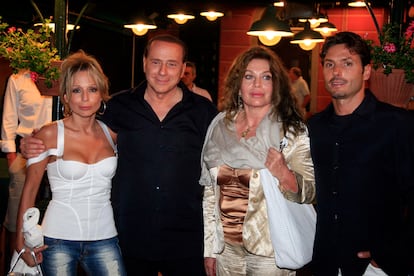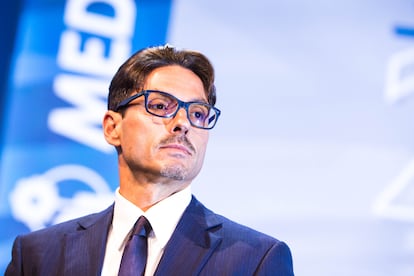Berlusconi’s great succession debate
The magnate’s death leaves in question the fate of his business empire, valued at €6 billion ($6.5 billion) and in the shadow of a possible sale to a French conglomerate


The comment was heard often: “If he dies, they will announce it on a Friday night. There’s too much at play.” The second part of the statement was irrefutable; the first has been shown to be a mere conspiracy theory. Silvio Berlusconi died on a Monday morning, perhaps at the worst moment for the markets to react. Yet the stocks of his empire, which employs 20,000 people and is valued at €6 billion ($6.5 billion), increased by 10%. There is uncertainty, of course. But the succession process, in which his five children will participate and which implies major changes in the family’s conglomerate, has incited a certain optimism in the markets.
Fininvest, managed by Berlusconi’s daughter Marina, is the conglomerate that has held all of Berlusconi’s businesses since the late seventies. Today it is a holding company whose primary asset is Mediaset (managed by his son Pier Silvio), transformed into an enormous European group with headquarters in the Netherlands and called MFE. Fininvest controls almost 50% of the media empire. The constellation of companies also includes the publishing company Mondadori, major real estate holdings — the businessman began his business career in that sector, and his empire owns villas valued at more than €500 million (about $540 million) — and sports properties, like the soccer club Monza, today in the Italian Series A.

Il Cavaliere owned 61% of Fininvest stocks until his death. The rest were distributed among his five children from two marriages. The oldest, Marina and Pier Silvio, a result of his relationship with Carla Elvira Lucia Dall’Oglio, each have 7.6%. The descendants of his marriage with Veronica Lario (Barbara, Eleonora and Luigi) each possess 21.5% of another holding company. The key question now is who will receive Berlusconi’s part — his partner, Marta Fascina, could change the balance — and how his death will change the company’s direction. His heirs may prefer to sell it, thinking of money and their peace of mind, or they may keep it in order to maintain their power, primarily in Italy and Spain.

In recent years, Fininvest had abandoned assets that it no longer considered strategic, from AC Milan to shares in the biotechnology company Molmed and the Italian investment bank Mediobanca. But media has remained its keystone. Berlusconi was perhaps the first in Italy to understand that advertising, politics and television worked better together than apart. He pioneered the model. But the control of the empire he designed, and which took over Italy’s narrative in recent decades, did not go unnoticed among major European groups in the sector. Vivendi, the company owned by the French Vincent Bolloré, has maintained a tense relationship with Mediaset in recent years. Now, a new chapter may be written.
Berlusconi signed a share-swap agreement with the French company in 2016, but things did not work out as planned, and Bolloré did not like the agreement reached. They worked through the tensions and found a formula that allowed for Vivendi’s slow exit from the group, which today owns 23.5% of the company with a right to vote. What will happen now? Sources in the sector believe the situation could lead to an agreement. “Vivendi is not likely to give a public acquisition offer. And the children, for now, will maintain most of the management. But Vivendi will still be interested, because the other Italian company in which it had shares (Telecom) is not responding as hoped,” sources say. Without Berlusconi, however, the question is completely open.

Sign up for our weekly newsletter to get more English-language news coverage from EL PAÍS USA Edition
Tu suscripción se está usando en otro dispositivo
¿Quieres añadir otro usuario a tu suscripción?
Si continúas leyendo en este dispositivo, no se podrá leer en el otro.
FlechaTu suscripción se está usando en otro dispositivo y solo puedes acceder a EL PAÍS desde un dispositivo a la vez.
Si quieres compartir tu cuenta, cambia tu suscripción a la modalidad Premium, así podrás añadir otro usuario. Cada uno accederá con su propia cuenta de email, lo que os permitirá personalizar vuestra experiencia en EL PAÍS.
¿Tienes una suscripción de empresa? Accede aquí para contratar más cuentas.
En el caso de no saber quién está usando tu cuenta, te recomendamos cambiar tu contraseña aquí.
Si decides continuar compartiendo tu cuenta, este mensaje se mostrará en tu dispositivo y en el de la otra persona que está usando tu cuenta de forma indefinida, afectando a tu experiencia de lectura. Puedes consultar aquí los términos y condiciones de la suscripción digital.








































